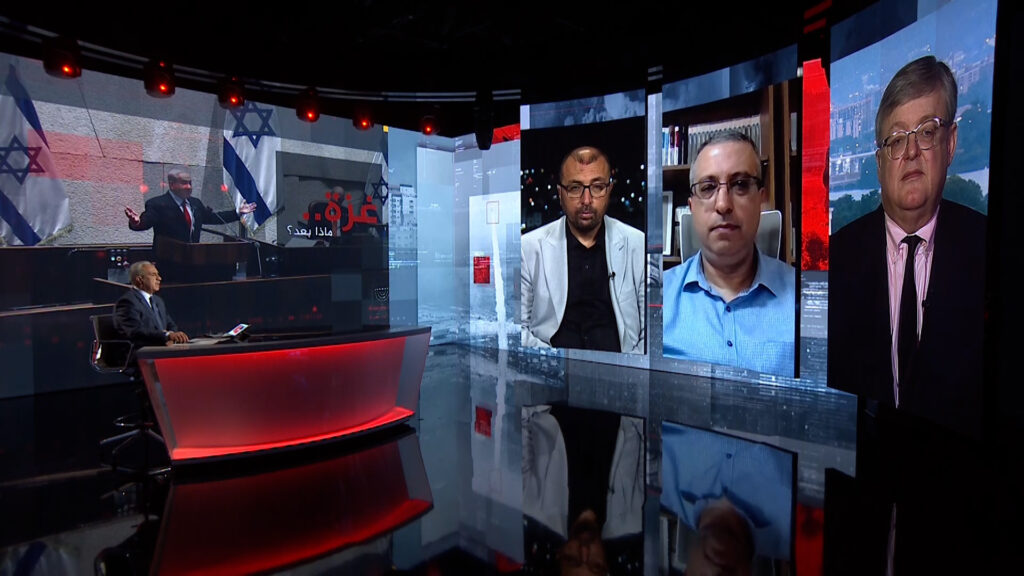Political writers and analysts ruled out reaching a ceasefire and prisoner exchange agreement in the Gaza Strip, despite the Security Council’s approval of a draft resolution submitted by the United States, based on President Joe Biden’s proposal at the end of last month.
During his talk on the program “Gaza… What’s next?”, the academic and expert on Israeli affairs, Dr. Muhannad Mustafa, said that there is no ceasefire in the foreseeable future because Israeli Prime Minister Benjamin Netanyahu does not want to stop the war or go to a deal with the Islamic Resistance Movement (Hamas).
Mustafa pointed out that Netanyahu is at a crossroads and that he has two options, not a third. Either go for a deal according to Biden’s proposal and then his right-wing government falls, or oppose the proposal and maintain it, stressing that he is in a more difficult position after the resignation of Benny Gantz from the War Council.
According to the expert on Israeli affairs, Netanyahu may resort to dissolving the Knesset (Parliament) and heading a transitional government for 3 months, which will remove from him the burden of responsibility for the war and concluding the deal, and then build his popularity again as the Israeli political scene is subject to major transformations.
In turn, writer and political researcher Sari Orabi believes that Hamas is aware of Washington’s tricks, as it welcomed the Security Council’s resolution and called for negotiations based on its positive concepts.
Orabi confirms that Hamas refuses to hold negotiations in order to continue the war and the systematic destruction of the basics of life in Gaza, indicating that it realizes that the balance is imbalanced, “so it relies on maneuvers, some of which relate to the field and combat, and others to its adherence to the negotiating constants.”
He pointed out that the movement also brings to mind the history of Palestinian-Israeli negotiations, and Israel’s method of evasion by entering into a negotiation process that has no horizon, as the latter wants to transfer its previous negotiating experience to Hamas.
He stressed that the steadfastness of the resistance led Israel and the United States to present a ceasefire proposal that they had not presented since the beginning of the war, but it contained traps, calling on the movement to be cautious and cautious of American intentions, and the ability of the Israelis to complete a limited amount of the deal, which is the first stage of it.
For his part, former US State Department official William Lawrence believes that the two sides of the conflict in the war are close to a second ceasefire since last December, although Israel is not willing to stop the war.
Lawrence called for pushing the two parties to begin negotiations on the details of the deal, stressing that a ceasefire is close but related to the negotiations that have not yet begun.
Washington’s position
Mustafa described Washington’s position as strange in light of its insistence on Israel accepting Biden’s proposal, despite the clearly rejecting statements of Netanyahu’s government ministers, stressing that Netanyahu will turn into a public opponent of the US President’s proposal.
Israel’s approval of Biden’s proposal also seems strange to Israeli society, which is pressuring Netanyahu to accept the proposal and go toward an exchange deal, according to the expert on Israeli affairs.
As for writer Sari Orabi, he described the United States as positioning itself as a false spokesman for the Israeli administration, citing Washington’s participation in the operation to recover Israeli prisoners in the Nuseirat camp, which led to the death and injury of about 1,000 Palestinians.
He stressed that everyone is a witness to a number of American contradictions, “as the Biden administration is involved in the war, has adopted the Israeli discourse since its beginning, and has largely prevented ceasefire attempts through the Security Council.”
He concluded that the Biden administration wants to blackmail and pressure the Hamas movement, and provide international and legal cover for the continuation of the war. It also wants to achieve for the Israelis through the field of diplomacy what they have not achieved in the field.
In turn, the former US State Department official said that Washington wants the war to end, but it does not want the ceasefire to be against the Israeli lobby in Washington, and against the wishes of Israel.
He acknowledged that the widespread international welcome in the Security Council for the ceasefire resolution places an additional burden on Washington, stressing at the same time that the latter is the only one that can help in reaching a ceasefire agreement, and its position has begun to change.
Lawrence described US Secretary of State Anthony Blinken as not a good negotiator, and said that he has a strategy biased towards the Israelis, which is based on always placing the blame on Hamas.

